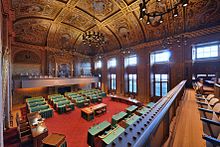Senate of the Netherlands
|
Senate Eerste Kamer |
|
|---|---|
| States General of the Netherlands | |
 |
|
| Type | |
| Type | |
| Leadership | |
|
First Vice President
|
|
|
Second Vice President
|
|
| Structure | |
| Seats | 75 |
 |
|
|
Political groups
|
Government (21) Opposition (54) |
|
Length of term
|
4 years |
| Elections | |
| Indirect party-list proportional | |
|
Last election
|
26 May 2015 |
|
Next election
|
2019 |
| Meeting place | |
 |
|
| Senate Chamber Binnenhof The Hague, Netherlands |
|
| Website | |
| www |
|
Government (21)
Opposition (54)
The Senate (Dutch: Eerste Kamer der Staten-Generaal [ˈeːrstə ˈkaːmər dɛr ˈstaːtə(n) ˌɣeːnəˈraːl] or simply Eerste Kamer [ˈeːrstə ˈkaːmər], literally "First Chamber", or sometimes Senaat [səˈnaːt]) is the upper house of the States General, the legislature of the Netherlands. Its 75 members are elected by the members of the twelve States-Provincial every four years, within three months of the provincial elections.
Members of the Senate are part-timers who often hold other positions as well. They receive an allowance which is about a quarter of the salary of the members of the House of Representatives. Unlike the politically more significant House of Representatives, it meets only once a week. Its members tend to be veteran politicians or part-time politicians at the national level, often having other roles.
It has the right to accept or reject legislative proposals but not to amend them or to initiate legislation. Directly after a bill has been passed by the House of Representatives, it is sent to the Senate and is submitted to a parliamentary committee. The committee decides whether the bill can be immediately put on the agenda of the full chamber or there should first be preparatory study of the bill. If a bill is immediately put on the agenda of the full chamber, it is passed as a formality without a debate.
The Senate was instituted by King William I in 1815. When the Netherlands and Belgium were united in 1815, the Belgians in particular pressed for the introduction of a bicameral system. In its early years, the Senate served as a bulwark of the Crown (the king and his ministers) since it was still able to block bills that displeased the king. Such bills were usually private member's bills from the House of Representatives. At that time, the members of the House of Representatives too were elected indirectly.
...
Wikipedia
